The CEO of Swiss pharmaceutical company Novartis said Saturday that it has enough stockpiles in the US to withstand any potential tariffs from President Trump, Reuters reported. Pharmaceuticals are exempt from the 39% tariffs Trump slapped on Switzerland in August, but an EU trade deal reached in July includes a 15% tariff on most drugs, except some generics.
“We have significantly increased our stockpiles in the U.S., so they will certainly last until mid-2026,” CEO Vas Narasimhan told Swiss newspaper Neue Zuercher Zeitung.
In other developments, following a Friday call between Trump and China’s President Xi Jinping, Trump said in a social post that an agreement to spin off the TikTok app in the US had been reached. Trump said the two leaders plan to conduct a series of meetings in the coming months, Yahoo Finance’s Ben Werschkul reported, with the first meeting at the Asia-Pacific Economic Cooperation (APEC) summit in South Korea, scheduled for Oct. 30-Nov. 1.
Trump said that Xi would reciprocate with a US visit “at an appropriate time.”
Amid complex trade talks with the US, China dropped a months-long antitrust probe into Google (GOOG) amid discussions of a TikTok deal — while also increasing pressure on domestic purchases of Nvidia (NVDA) chips.
Meanwhile, Trump’s visit to the UK saw some deals and announcements. The UK has shelved plans to talk with the US on removing British steel tariffs, meaning current duties will stay in place, according to a report in Bloomberg.
British drugmaker GSK (GSK) said on Wednesday it will invest $30 billion in US research and development. GSK is the largest pharmaceutical firm to scale up its US footprint as Trump threatens to impose import tariffs on the industry and seeks more domestic manufacturing.
Treasury Secretary Scott Bessent, who led the US delegation during talks with Chinese trade officials in Spain this week, said that he is confident a trade deal with China is near.
With reciprocal tariffs set to take effect in November, Bessent told reporters he expects further talks to happen before then.
In the background, the Supreme Court is reviewing a high-stakes legal challenge to President Trump’s tariffs, setting up a resolution as early as this fall.
The high court put the case on track for oral arguments in early November. That puts the case on an unusually quick track to resolution.
The tariffs at stake are the sweeping “reciprocal,” country-specific duties Trump has outlined in various steps this year (which you can see in the graphic below). Those duties range from 10% to 50%. Trump has used a 1977 law known as “IEEPA” — the International Emergency Economic Powers Act — to justify imposing the tariffs.
